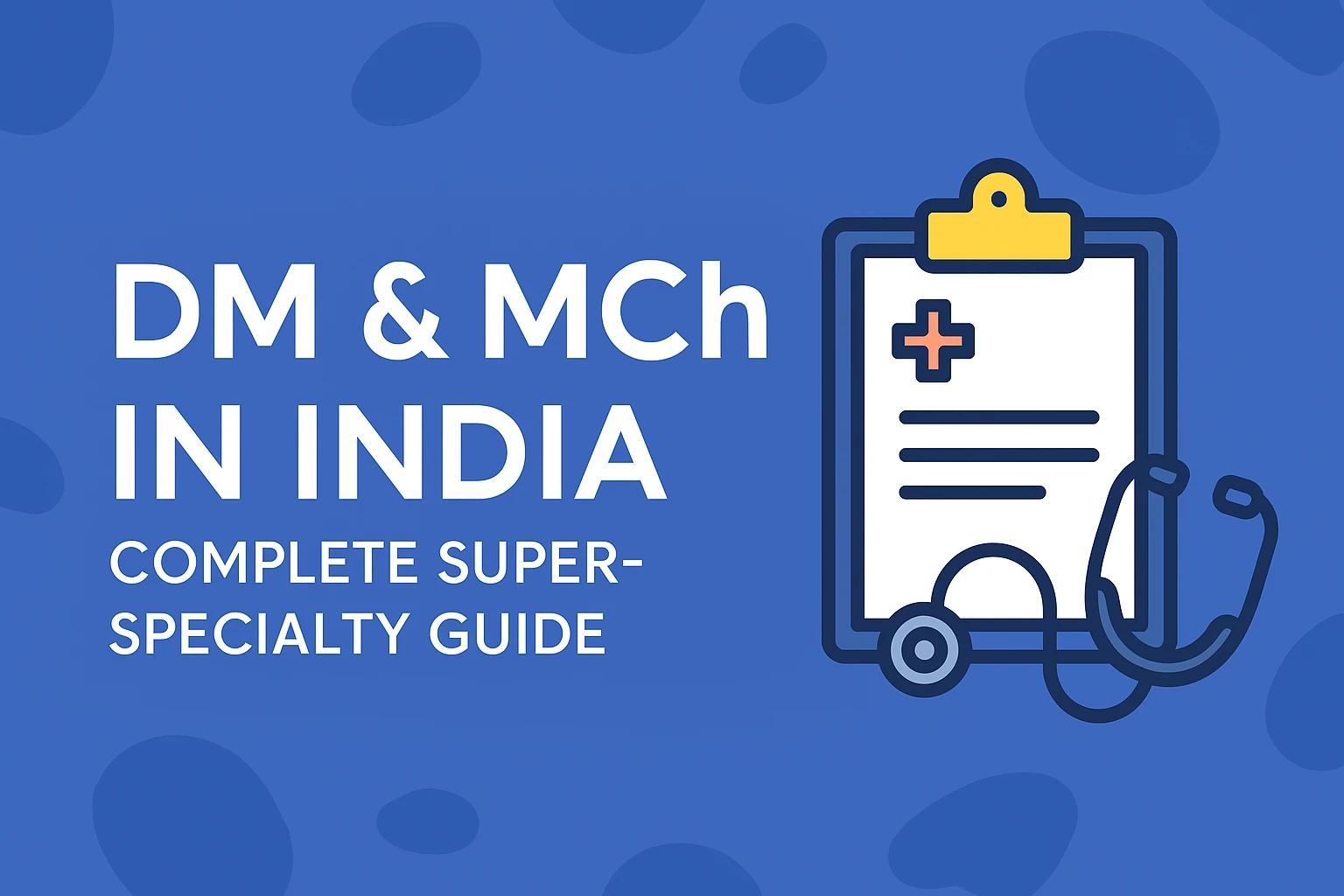Pursuing super-specialty medical education in India represents a significant milestone for doctors aiming to excel in niche fields. DM, which stands for Doctorate of Medicine, and MCh, meaning Master of Chirurgiae, are advanced postgraduate degrees that allow physicians to specialize further after completing their MD or MS. These programs equip professionals with in-depth knowledge and skills in areas like cardiology, neurology, neurosurgery, and more. As the healthcare landscape evolves, the demand for such specialists surges, particularly in a populous nation like India. However, navigating the admission process requires careful planning and awareness of key requirements. Moreover, with the current date being September 29, 2025, recent updates in entrance exams and seat distributions play a crucial role. This guide aims to provide a comprehensive overview, helping aspiring candidates make informed decisions.

Table of Contents
- Differences Between DM and MCh
- Eligibility Criteria for DM and MCh
- Entrance Examinations: NEET-SS and More
- Application Process for Super-Specialty Admissions
- Available Specialties in DM and MCh
- Top Institutions Offering DM and MCh Programs
- Course Duration and Structure
- Fees and Financial Aspects
- Preparation Tips for NEET-SS
- Career Prospects After DM/MCh
- Emerging Trends and Challenges
- Frequently Asked Questions (FAQ)
- Conclusion
Differences Between DM and MCh
Transitioning from general postgraduate studies to super-specialties involves understanding the distinctions between DM and MCh. DM focuses on medical branches, such as endocrinology or gastroenterology, emphasizing non-surgical interventions. In contrast, MCh pertains to surgical disciplines, including cardiothoracic surgery or plastic surgery. Both degrees typically span three years, building on the foundation laid by MD/MS programs. Furthermore, these courses are regulated by the National Medical Commission (NMC) and offered by premier institutions across the country. Aspiring students must recognize that eligibility hinges on prior qualifications, ensuring only those with relevant experience proceed. Consequently, this pathway not only enhances expertise but also opens doors to advanced career opportunities in hospitals, research, and academia.
Eligibility Criteria for DM and MCh
Eligibility for DM and MCh programs in India is stringent to maintain high standards. Candidates must possess an MD or MS degree from a recognized university, along with permanent registration with the Medical Council of India or State Medical Council. Additionally, for NEET-SS 2025, applicants need to have completed their postgraduate degree by the specified cutoff date. Moreover, DNB qualifiers are also eligible, broadening the applicant pool. However, age limits may apply in certain states, though there’s no upper age cap for national-level entrances. Furthermore, international medical graduates must obtain equivalency certificates. As a result, thorough verification of documents is essential during applications. In essence, meeting these criteria ensures candidates are prepared for the rigorous training ahead.
Entrance Examinations: NEET-SS and More
The primary entrance examination for DM and MCh admissions is the National Eligibility cum Entrance Test for Super Specialty (NEET-SS). Conducted by the National Board of Examinations in Medical Sciences (NBEMS), it assesses knowledge in feeder specialties. For 2025, the exam pattern includes 150 multiple-choice questions, divided into one section, with a duration of 2.5 hours. Each correct answer awards four marks, while incorrect ones deduct one mark. Additionally, the syllabus is based on the PG exit-level curriculum of the relevant broad specialty. Therefore, preparation demands a deep dive into subjects like medicine, surgery, or pediatrics, depending on the chosen super-specialty. Moreover, INI-SS, for institutes of national importance like AIIMS, follows a similar structure but may have separate counseling. Consequently, understanding these patterns aids in strategic studying.
Application Process for Super-Specialty Admissions
Applying for NEET-SS involves several steps, starting with online registration on the NBEMS website. Candidates must fill out the form, upload documents, and pay the fee, which is around INR 4,250 for general categories. Following this, admit cards are released a week before the exam, scheduled for November 2025. After the test, results are declared within a month, leading to counseling rounds conducted by the Medical Counseling Committee (MCC). During counseling, choices for specialties and colleges are locked based on ranks. Furthermore, for management or NRI quotas, separate processes exist in private colleges. As such, staying updated via official portals is crucial to avoid missing deadlines. In addition, reservation policies apply, benefiting SC/ST/OBC and PwD candidates.
Available Specialties in DM and MCh
DM and MCh encompass a wide array of specialties, catering to diverse medical interests. For DM, popular branches include Cardiology, Nephrology, Neurology, Endocrinology, Gastroenterology, and Medical Oncology. On the other hand, MCh options feature Neurosurgery, Urology, Cardiothoracic Surgery, Plastic Surgery, and Pediatric Surgery. Moreover, emerging fields like Critical Care Medicine and Interventional Radiology are gaining traction. Each specialty requires specific feeder qualifications; for instance, MD Medicine for DM Cardiology. Therefore, aligning one’s PG background with the desired super-specialty is vital. Additionally, seat distribution varies; INI-SS 2025 offers hundreds of seats across AIIMS and other top institutes. As a result, competition is fierce, with thousands vying for limited spots.
Top Institutions Offering DM and MCh Programs
India boasts several prestigious institutions offering DM and MCh programs. Leading the pack is All India Institute of Medical Sciences (AIIMS), Delhi, renowned for its state-of-the-art facilities and research opportunities. Similarly, Postgraduate Institute of Medical Education and Research (PGIMER), Chandigarh, excels in super-specialties like Neurology and Cardiology. Furthermore, Christian Medical College (CMC), Vellore, provides excellent training in surgical branches. Other notables include Jawaharlal Institute of Postgraduate Medical Education and Research (JIPMER), Puducherry, and Sanjay Gandhi Postgraduate Institute of Medical Sciences (SGPGIMS), Lucknow. In the private sector, Amrita Institute of Medical Sciences, Kochi, and Kasturba Medical College, Manipal, offer quality education. Consequently, choosing based on location, faculty, and infrastructure is advisable.
Course Duration and Structure
The duration of DM and MCh courses is uniformly three years, involving intensive clinical training, research, and thesis submission. The curriculum integrates theoretical classes, practical sessions, and rotations in specialized departments. For example, in DM Nephrology, students learn advanced dialysis techniques and transplant management. Likewise, MCh Neurosurgery emphasizes operative skills and neuroimaging. Moreover, assessments include periodic evaluations, case presentations, and final examinations. Additionally, some programs incorporate fellowships or electives abroad. As such, this structure fosters holistic development, preparing graduates for real-world challenges. However, the demanding schedule requires strong time management.
Fees and Financial Aspects
Fees for DM and MCh vary significantly between government and private institutions. In public colleges like AIIMS, annual fees range from INR 2,000 to 10,000, making it accessible. Conversely, private seats can cost up to INR 20-50 lakhs per year, especially under management quotas. Furthermore, stipends during training, around INR 80,000-1,00,000 monthly, help offset expenses. Scholarships from bodies like ICMR support meritorious students in research-oriented programs. Therefore, financial planning is essential, including loans or sponsorships. In addition, NRI quotas have higher fees but guaranteed seats. For more on financing education, explore Top Education Loan Options for Indian Students in 2026.
Preparation Tips for NEET-SS
Preparing for NEET-SS demands a structured approach. Begin by reviewing the syllabus, focusing on high-yield topics from feeder specialties. Utilize resources like standard textbooks, online platforms such as PrepLadder, and previous years’ papers. Moreover, join coaching institutes for mock tests and doubt-clearing sessions. Time management is key, allocating hours to weak areas. Additionally, clinical exposure during PG enhances conceptual understanding. As a result, consistent effort over 6-12 months yields better ranks. Furthermore, maintaining physical and mental health prevents burnout.
Career Prospects After DM/MCh
Career prospects post-DM/MCh are promising yet competitive. Graduates can secure positions as consultants in multispecialty hospitals, earning INR 1.5-3 lakhs monthly initially. Government jobs via UPSC or state services offer stability and perks. Moreover, academic roles in medical colleges allow teaching and research, with ICMR funding available. Private practice in urban areas thrives for surgical specialists. However, challenges like state bonds and limited vacancies persist, leading to some seats remaining unfilled. Nevertheless, international opportunities, such as fellowships abroad, enhance profiles. For related career paths, check Global Civil Service Careers: Roles and Opportunities.
Emerging Trends and Challenges
Emerging trends in super-specialties include telemedicine and AI integration, expanding scopes. For instance, DM in Critical Care is vital post-pandemic. Additionally, subspecialties like interventional cardiology offer lucrative paths. Yet, oversaturation in popular fields like Cardiology necessitates diversification. Therefore, aligning with personal interests and market demands is wise. In rural areas, incentives for specialists address healthcare disparities. Challenges in pursuing DM/MCh include intense competition, with success rates below 10%. Financial burdens and long training periods deter some. Moreover, work-life balance suffers during residencies. However, reforms like unified entrances streamline processes. Future outlook remains positive, with increasing healthcare investments.
Frequently Asked Questions (FAQ)
What is the difference between DM and MCh?
DM (Doctorate of Medicine) focuses on medical super-specialties like cardiology or neurology, emphasizing non-surgical treatments. In contrast, MCh (Master of Chirurgiae) is for surgical fields such as neurosurgery or urology. Both require an MD/MS background and last three years.
Who is eligible for NEET-SS 2025?
Candidates with an MD/MS/DNB from a recognized institution and MCI/SMC registration are eligible. Completion of PG by the cutoff date is mandatory. International graduates need equivalency, and there’s no national age limit.
How many seats are available for DM/MCh in India?
Seat numbers vary annually. For INI-SS 2025, hundreds of seats are offered across AIIMS and similar institutes. Overall, thousands compete for limited spots in government and private colleges.
What is the fee structure for DM/MCh programs?
Government institutions charge INR 2,000-10,000 annually, while private ones can reach INR 20-50 lakhs per year. Stipends of INR 80,000-1,00,000 monthly are provided, and scholarships are available.
How to prepare effectively for NEET-SS?
Focus on feeder specialty syllabi using textbooks, online resources like PrepLadder, and mock tests. Clinical experience helps, and consistent study over 6-12 months is recommended. Maintain health to avoid burnout.
What are the career options after completing DM/MCh?
Graduates can work as hospital consultants, in government services, academia, or private practice. Salaries start at INR 1.5-3 lakhs monthly, with opportunities for international fellowships and research.
Will rates rise in 2026?
Projections stable, but inflation may add 0.25-0.5%. For official details, visit the National Medical Commission.
Conclusion
In conclusion, DM and MCh represent the pinnacle of medical education in India, fostering expertise and innovation. By understanding eligibility, exams, and career paths, aspirants can navigate this journey effectively. Moreover, with evolving trends and institutional support, these programs promise rewarding futures. Ultimately, dedication, strategic preparation, and perseverance are key to success in super-specialties, contributing to India’s healthcare advancement. For global education insights, explore Study Abroad: Choose the Best University in 2026 or Top In-Demand Administrative Careers for 2026.


